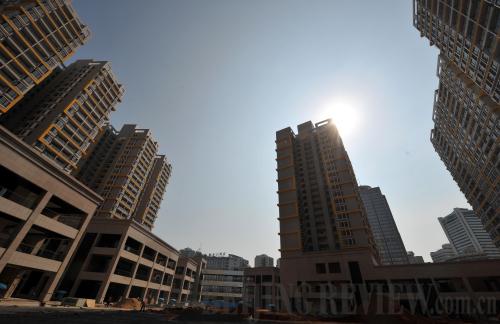|
 |
|
AFFORDABLE HOUSING: Hainan Province is building more affordable and low-rent homes for local residents (GUO CHENG) |
The property bubble in China is about to burst. And the bearish property market could last for as long as five years, said Xie Guozhong, an independent economist and director of Rosetta Stone Capital Ltd., on his blog.
"Housing prices might be cut in half at the lowest point, and the average price per square meter will be equivalent to two months' average salary," he said. "Land prices could also fall dramatically."
Xie said the turning point is emerging because of tightened liquidity, policy deterrence and a change in supply and demand.
Xie is not alone in predicting a downward property market trend. A large number of Chinese economists agree that the property market will return to normal, citing a series of new policies recently adopted by the Chinese Government meant to control runaway housing prices.
On October 19, the central bank announced plans to raise the benchmark one-year lending and deposit rates by 0.25 percentage points, effective on October 20, a move widely seen as the government's action against the inflationary pressure and the bubbling property market.
According to analysts' calculations, property buyers with a housing mortgage of 1.5 million yuan ($225,000) over 20 years will have to pay an extra 40,000 yuan ($6,123).
Over the past two years, the Chinese people have become increasingly concerned themselves with the dramatic surge in property prices. Last April, the State Council issued a notice to "firmly suppress the increase of housing prices in some cities" and vowed to stabilize housing prices by implementing financial, land and credit restrictions. Market analysts at first believed the policy could contain the surging housing prices and would result in a wait-and-see atmosphere among consumers and a slump in property trading volume.
Stricter policies
However, this supposedly harsh policy was only effective for about four months. Starting in August, the trading volume and the value of existing homes have been on the rise. Figures from the National Bureau of Statistics issued on October 15 showed that in September, housing prices in 70 large and medium-sized cities rose 9.1 percent year on year and 0.5 percent from the previous month.
The rebound in house prices has caused the government to question the effectiveness of its control policy. In order to make the policy really work, a number of government departments, including the National Development and Reform Commission, the Ministry of Finance (MOF), State Administration of Taxation, the Ministry of Land Resources (MLR) and the Ministry of Housing and Urban-Rural Development (MHURD), jointly released four documents on the same day to control the property market. This was the most severe series of measures adopted so far to control the problem.
For cities with abnormally high property prices and those with excess growth of home prices, MHURD stated the local governments should limit the number of homes that one family can buy. To date, big cities like Beijing, Shanghai, Hangzhou, Nanjing, Ningbo, Fuzhou and Shenzhen have all taken similar measures to restrict property purchases, limiting new residential properties to one per family.
The central bank ordered commercial banks to stop providing loans to families who purchase a third or subsequent properties. Down payments for first home buyers have been increased to 30 percent from previous 20 percent, while the down payment for second home buyers is now 50 percent with a loan interest rate of no less than 1.1 times the benchmark loan interest. The central bank is also requiring that commercial banks strictly manage loans for consumption purposes—and consumption loans should not be used to buy properties. Any bank defying the central bank's rule will face serious punishment.
Commercial banks should, on the other hand, give priority to the financing needs of property developers that are committed to building affordable housing projects.
The MOF has readjusted the contract tax and personal income tax in the property trading process. It has strengthened supervision and inspection over the collection of the land appreciation tax, especially over property projects whose prices are higher than adjacent properties.
The Chinese Securities Regulatory Commission said the refinancing needs of real estate developers must first consult the MLR. Those that fail to acquire the right to use the land or fail to use the land properly will be denied refinancing plans.
Supervision over the property market, especially over real estate agents' inflating home prices, will be further enhanced. Property developers that leave the acquired land idle, alter the use and function of land, and deliberately postpone the time to open or close a property projects will be subject to such punishments as suspension of bond issuance or getting loans from commercial banks.
In addition, the MHURD will increase land supply for construction of affordable homes and low-rent housing projects.
| 